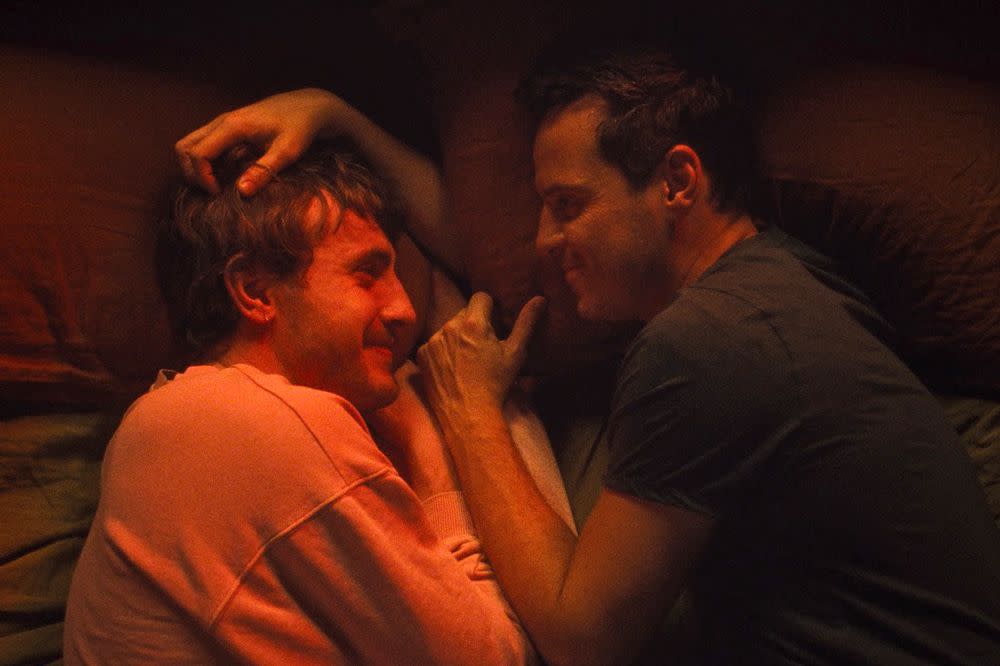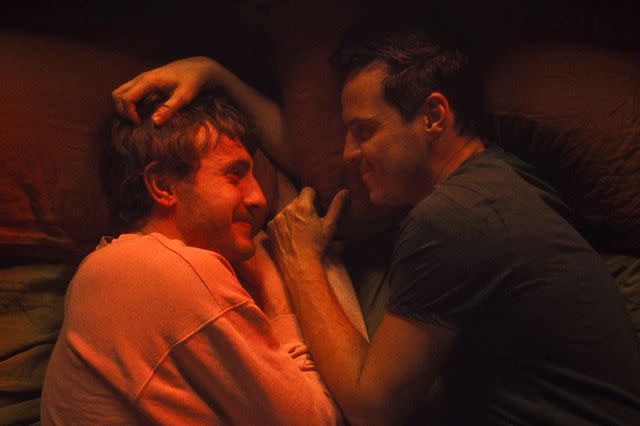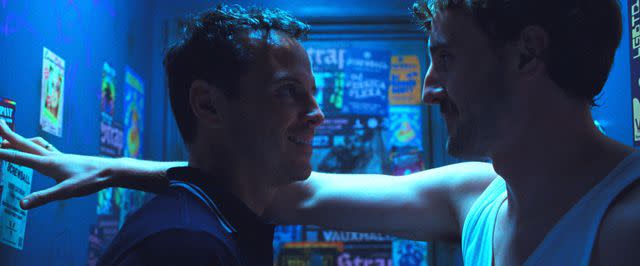“All of Us Strangers” director on how he found hope in the film's emotional ending

- Oops!Something went wrong.Please try again later.
- Oops!Something went wrong.Please try again later.
Writer-director Andrew Haigh and producer Graham Broadbent explain how they took a traditional Japanese ghost story and went an entirely new direction.
Warning: This article contains spoilers from All of Us Strangers.
Everything about All of Us Strangers, the new film from Looking and Weekend filmmaker Andrew Haigh, is centered on finding hope in dark places — even going back to how the movie was made in the first place.
Haigh was inspired by the novel Strangers by Japanese author Taichi Yamada which was published in 1987 and later translated into English in 2003. "It's much more a traditional Japanese ghost story, I guess," Haigh tells EW, sitting in the lounge of the Mandarin Oriental hotel in Manhattan's Columbus Circle back in October alongside producer Graham Broadbent.
The source material, which had previously been adapted into a 1988 Japanese horror film, follows a 47-year-old screenwriter who sees the ghosts of his dead parents and realizes they are sapping his life force. There's also a feminine demonic spirit who's trying to destroy this man — not anything like the gentle, cathartic love story Haigh eventually wove together for his film.
"Even from our very early discussions, we all felt that that wasn't necessarily what we wanted to do with the story," Haigh says. "We tried to use the idea of a ghost in a different way."

Searchlight Pictures
Paul Mescal's Harry and Andrew Scott's Adam in 'All of Us Strangers'All of Us Strangers, in theaters now, instead takes its main character, Andrew Scott's isolated screenwriter Adam, and transplants him into a modern London setting. He still sees the ghosts of his dead parents — in this case, Jamie Bell's "dad" and Claire Foy's "mum" — but it's more a story about dealing with grief, the things left unsaid, and the hope of finding happiness again than anything nightmarish. And instead of a female demon, Paul Mescal arrives on the scene as Harry, Adam's equally lonely neighbor. The two fall in love and help gently coax each other out of their emotional cocoons, while Adam is working through his long-repressed issues with his parents. It's then revealed in the end that Harry is a ghost as well.
When Adam finally makes peace with his grief, he returns to his apartment complex in search of Harry. Realizing he's never actually been inside his boyfriend's apartment, he finally does so and discovers Harry's lifeless body in the bedroom. Harry drank himself to death that first night he showed up inebriated on Adam's doorstep looking for companionship. Adam now lies with Harry's ghost, cradling him on their bed as the song "The Power of Love" begins to play over the credits.
"In many ways, the whole film to me was a love letter saying, it's okay. It's quite hard. You've all been through some stuff, but you can move on from this and you can find love," Haigh says. "You might lose it again, but you might find it again. That to me is an optimistic outcome in some strange sense, that you can just keep finding love even when it vanishes. And it doesn't vanish forever. That's important to me. That's where it is all about love at the end."

Searchlight Pictures
Andrew Scott and Paul Mescal in 'All of Us Strangers'"There's something in Andrew's filmmaking. Although it's a sad story, there's something kinder and gentler and more beautiful, more generous," Broadbent adds. "People might perceive the end of the film as being sad, but I think when you watch it again and again, you see it's actually more optimistic." Paraphrasing EW's own review of All of Us Strangers, he adds, "It'll break your heart, but it might just mend it too. I find at the end of the film, probably having lived with it for a while, there's a real beauty and a gentleness and an optimism there, which is very, very far from the book."
Haigh shares that he doesn't quite care for the logic of the story behind All of Us Strangers. He doesn't care about, "What's real or what's not?" The way he talks about it echoes an exchange from the film itself: Adam asks his mum's ghost, "Is this real?" to which she responds, "Does it feel real?"
"It's about the emotional feeling that you get from it," Haigh says of the film. "That's the key."
Scott, speaking separately for an upcoming episode of EW's Awardist podcast, agrees. "I feel very strongly that the film is like a dream," he explains. "You wake up from a very, very potent dream and you can feel so sad; you can wake up with floods of tears; you can wake up screaming; you can wake up laughing. I don't think you go, 'What happened in the dream? Let's rewind it.' We try desperately to understand it, but I think Andrew's achievement is that he directs us towards the feeling, rather than the logic of what the feeling might be. The most important thing, and the most difficult thing to do, is making the audience genuinely moved."
Want more movie news? Sign up for Entertainment Weekly's free newsletter to get the latest trailers, celebrity interviews, film reviews, and more.
Related content:
Andrew Scott and Paul Mescal discuss their onscreen romance in All of Us Strangers
All of Us Strangers review: Andrew Scott and Paul Mescal are devastatingly sexy and sad
Paul Mescal, Andrew Scott find love and ghosts in emotional All of Us Strangers trailer
Read the original article on Entertainment Weekly.

